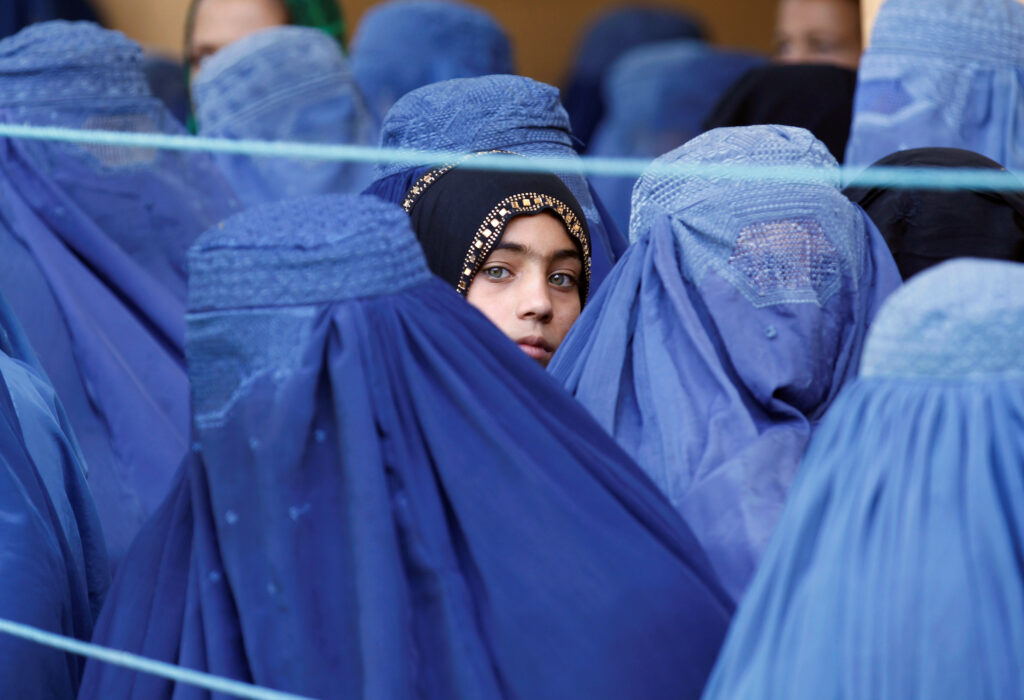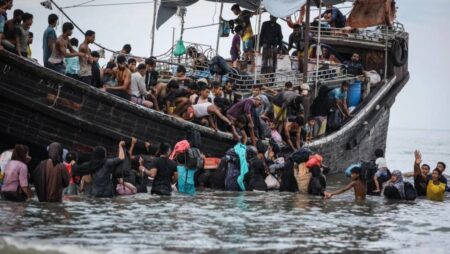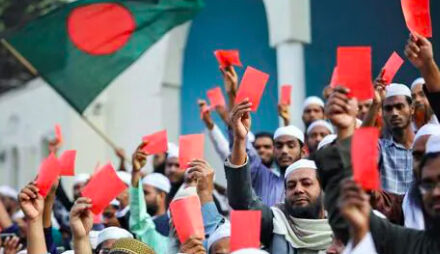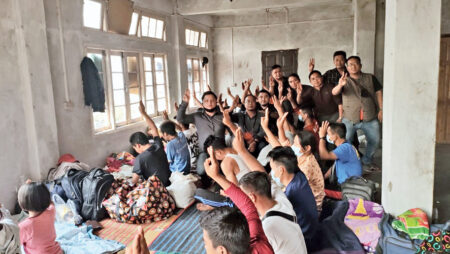MANTRAYA POLICY BRIEF#49: 20 DECEMBER 2023
Women’s Rights in Afghanistan under Taliban 2.0: Strategies for a Sustainable Change
EKAMPREET KAUR, RATNADEEP CHAKRABORTY & SHANTHIE MARIET D’SOUZA
Abstract
The capture of power by the Taliban in August 2021 unveiled a regime of regressive policies, grievously impacting the rights of women and girls in Afghanistan. Despite attempts by the international community and a demonstration of a modicum of moderation in the initial days, the Taliban 2.0 reintroduced their strict interpretation of Shariah, closing girls’ schools and imposing severe restrictions on women. This not only oppresses a significant section of the population but also hampers the country’s economic growth and development. A nuanced approach to gradual social change by addressing the structure-agency debate would be practical and sustainable, promoting cultural communication on women’s rights, and striving for inclusive policy-making and economic rebuilding. The international community needs to address these challenges to foster sustainable social change and transformation in Afghanistan.
Life under Taliban 2.0
Upon capturing power in 2021, the Taliban swiftly implemented regressive policies, particularly curtailing rights of women and girls, which have had profound implications, particularly in the realm of education and employment. Despite initial optimism for collaboration and projection of reformed (moderate) Taliban to seek recognition and legitimacy from the international community, promises to reopen secondary schools for girls were reneged upon. It, at one level, revealed the international community’s inability to moderate the Taliban’s position. The Taliban’s discriminatory approach manifested early on, with the opening of secondary schools exclusively for boys, starkly contrasting with the silence on girls in the Ministry of Education’s official statement on 18 September 2021. This marked the beginning of the imposition of a series of restrictions, exemplified by the directive for female employees of the Kabul city administration to stay at home unless their roles could not be fulfilled by men.
In May 2022, a significant turning point occurred with the imposition of new dress codes for women, endorsed by Taliban leader Mullah Haibatullah Akhundzada. This shift in women’s attire led to a noticeable increase in disappearances from public life, exacerbating economic hardships and fostering a rise in early marriages among women deprived of educational and employment opportunities. By the end of 2023, women faced ban from universities, public spaces such as NGO work and even beauty salons, as the Taliban’s severe restrictions had reversed all achievements over the last two decades. Eroding the rights of women and girls not only suppresses half of the population but also undermines the Taliban’s attempts at economic recovery in the aftermath of war.
The existing humanitarian crisis, compounded by a political and women’s rights crisis, is grave, if not unparalleled. To add to context, approximately 23 per cent of Afghans in urgent need of humanitarian aid are women, and more than 80 per cent of secondary school-age Afghan girls and young women are out of school, including more than 100,000 female university students. The Taliban’s ban on secondary education for girls has led to a decline in their attendance in all Afghan provinces, including Kabul, where there has been a 63 per cent decrease. This marks a significant erosion of two decades of progress in attendance rates. Further, this fosters a widespread feeling of despair among women and girls in Afghanistan, coinciding with an increase in instances of suicidal tendencies among girls.
The international community has reacted to the Taliban’s policies with a mix of condemnation, diplomatic pressure, and suspending aid and even isolation. Verbal condemnation through resolutions and statements has been strong but has had limited influence on Taliban ideology and policies. Similarly, diplomatic endeavours, such as negotiations and incentives with the Taliban, have produced uneven outcomes. Engaging in conditional dialogues with incentives, such as the World Bank, has strategically employed measures like allocating over $1 billion from the frozen Afghanistan Reconstruction Trust Fund (ARTF). The goal is to ensure active participation and benefits for girls and women in proposed education and healthcare projects. However, the outcomes have been sub-optimal, including instances of making limited exceptions on specific courses if women adhere to a strict dress code and are accompanied by a male member. Additionally, there have been frequent policy reversals from the Taliban.
Alternative options
In the current circumstances, adopting a nuanced approach to encourage social change gradually to bring about changes in the structure and agency is much required in responding to the Taliban’s oppressive stance rather than any radical measures like curtailing humanitarian aid by the international community that might only serve as a collective punishment for the entire Afghan population. This approach could also involve safeguarding women activists, journalists, politicians, and civil society groups whom the international community have fostered in the last two decades in Afghanistan. Some of the recommendations include the following.
- Cultural Communication on Women’s Rights: Political leaders and scholars from the Muslim world could proactively communicate their interpretation of women’s rights under Sharia law to the Taliban and the Afghan people. Leveraging cultural messaging that underscores the broader rights enjoyed by women in other Muslim-majority nations can effectively counter the Taliban’s narrow claims about Islam. The acceptance of cultural relativism is crucial in the international response.
- Supporting UN Special Rapporteur and Civil Society: Continued support for the UN Special Rapporteur on the situation of human rights in Afghanistan’s mission is vital, involving the renewal of mandate and the enhancement of investigative authorities and resources for documenting Taliban violations comprehensively following the Human Rights Council resolutions 48/1, 51/20 and 54/1. Simultaneously, financial and moral backing for Afghan civil society and women-led organizations is imperative, providing sustained support to these groups navigating increased restrictions. The civil society in Afghanistan can play an important role to achieve long-term change in the society. The UN needs to compel the Taliban to take proactive measures to support Afghan women to engage in decision-making processes in Afghanistan and about Afghanistan.
- Principled Engagement with the Taliban: Engagement with the Taliban should be guided by human rights principles, explicitly differentiating it from formal recognition. Leading discussions, the OIC and Muslim-majority states like Turkey and Saudi Arabia should emphasize human rights in every interaction, with clear consequences outlined for violations, ensuring principled and accountable engagement. Also, countries like the US, European Union and India should engage with the Taliban to keep the vital programmes running through conditional donor funding.
- Protecting and Expanding Civic Space: To counter the Taliban’s radical ideology, defending Afghanistan’s shrinking civic space is paramount. Support through extensive and flexible funding with adequate international representation for civil society organizations, independent media organizations, cultural activists, and academics will help preserve the pluralistic nature of Afghan life. The international community must recognize and prosecute the Taliban’s crimes against women, reinforcing accountability through resolutions that label their policies as gender discrimination and persecution.
- Inclusive Policy Making and Economic Rebuilding: Rebuilding the Afghan economy is imperative, focusing on critical infrastructure investments and sustainable development efforts to address the fundamental needs of the Afghan population. Empowering Afghan women necessitates long-term strategies, including access to education and proper healthcare facilities within regime constraints, and participation in economic activities compatible with the Taliban’s restrictions. Transformative infrastructure projects like irrigation and water systems, as well as providing electricity, can positively impact the status of women in Afghanistan, making domestic work safer, alleviating poverty and allowing more time for income-generating activities.
- Gender sensitive Assistance: The international community should also explore humanitarian assistance and livelihood opportunities, with a specific focus on households led by women and those where women served as the primary breadwinners. Additionally, support for education, including initiatives facilitated by non-governmental organisations in community-based programs, is crucial. Including men in capacity building and livelihood projects will help bring about inclusive and structural gains enhancing the capacity and agency of women.
Future Pathways
In response to the Taliban’s oppressive policies, a nuanced approach to building a long-term social change may be sustainable. Providing platforms to women and social activists, journalists, and politicians, is crucial for promoting inclusiveness. The recommendation to engage in cultural communication on women’s rights, support the UN Special Rapporteur, and maintain principled engagement underscores diplomatic strategies. However, engaging with the Taliban on conditions for vital programmes is the most viable policy. While this approach might ensure essential services, the limitation lies in the challenge of enforcing conditions and the risk of legitimizing the Taliban’s regime. A gradual and comprehensive structural transformation that enhances the agency for women may help bring about long-term sustainable change in Afghanistan.
(Ekampreet Kaur and Ratnadeep Chakraborty are Research Interns at Mantraya. Dr. Shanthie Mariet D’Souza is the Founder & President, Mantraya. This Policy Brief has been published as part of Mantraya’s ongoing “Fragility, Conflict, and Peace Building” and “Mapping Terror & Insurgent Networks” projects. All Mantraya publications are peer-reviewed.)



